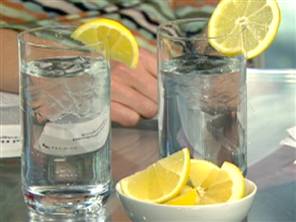February 29, 2008, - 4:12 pm
Fecal Germ Magnets: Stop Ordering Lemon Slices With Your Drink
By Debbie Schlussel
If you’re like me, and you like ordering lemon slices with your drinks at restaurants, bars, etc., it might be a good idea to stop. After reading this, I won’t ask for them any more. In fact, I’ll ask that they NOT be used.
A science professors study of 76 lemon slices from various restaurants found that 53 of them harbored harmful germs, including those associated with fecal material. Poop in your drink? Eeuuww!:
Who knows whether these lemons have been handled using sanitary procedures? Anne LaGrange Loving, a professor of science at Passaic County Community College, decided to find out.

Loving began her investigation after she saw a waitress’ fingertips dip into her soda as the drink was being brought to her table. Although lemon juice is known to kill germs, Loving devised a study to determine whether lemon slices contain germs when they are served to customers.
Using sterile collection swabs, Loving took two samples from each of 76 lemons that were served in restaurants in North Jersey. Patrons normally start to drink a beverage moments after it is served, so samples were taken right away, before a sip was taken and before anyone at the table touched it. One swab was rubbed along the rind, while a second was rubbed along the pulp. The restaurants were unaware that she was doing this. Samples were then analyzed for microbes at a clinical microbiology laboratory.
A total of 25 different types of germs were found on 53 out of the 76 lemons that were sampled. Some were fecal in origin (either from dirty fingertips of the restaurant employees, or from meat-contaminated cutting boards and knives), while others were types commonly found in saliva, on the skin and in the environment.
One sample had six different microorganisms on it, three of which are found in fecal material. Although some lemon slices had germs either only on the rind or only on the pulp, 29 percent had germs on both sites. In 15 instances the germs on the pulp were completely different from those on the rind, indicating that the pulp had been in contact with a contaminated surface as or after it was sliced. Sometimes when more than one lemon was sampled during a single restaurant visit, different germs were found on each.
Although there have been no reported outbreaks of illnesses attributed to lemon slices in beverages, every microorganism that was recovered had the potential to cause a variety of human infections.
This gives the saying, “Think before you drink,” a whole new meaning. GUH-ROSS!
Tags: Anne LaGrange Loving, beverage moments, cutting boards, Debbie Schlussel, human infections, knives, Passaic County Community College, professor of science, surface, waitress


I wonder how many of these restaurants employed illegal aliens who never had to meet any health requirements to invade our country?
c f on February 29, 2008 at 8:27 pm